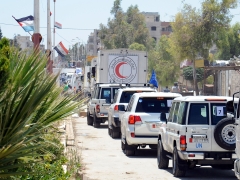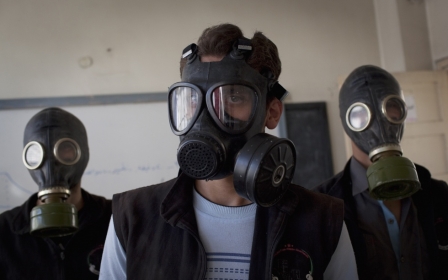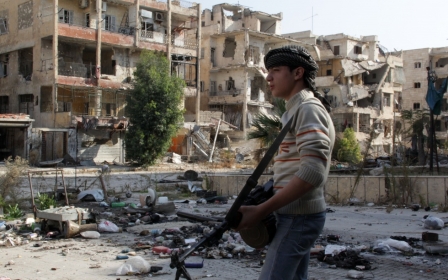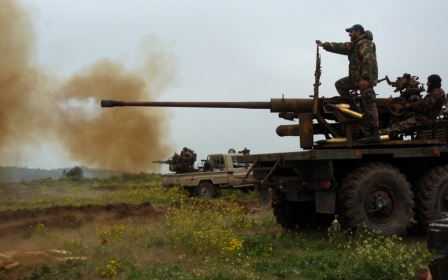Unauthorised UN aid convoys enter Syria as Assad sworn in

Syria's President Bashar al-Assad is to be sworn in Wednesday for a new term in the war-ravaged country, while other conflicts in the region get the attention of the international community.
Assad will be sworn in for a seven-year term at his palace overlooking the capital, three years into a war that has killed more than 170,000 people and forced millions to flee their homes.
The 48-year-old secured the majority of votes in the country's 3 June election that was called a "farce" by detractors.
Syrian troops continue to pound rebel-held areas, focusing on Aleppo in the north this week.
Also this week, in what was called "a major step forward" in the international community's efforts to respond to internally displaced and besieged Syrians, the UN adopted a resolution authorising aid convoys to enter Syria without the consent of Assad's government.
The first of these convoys crossed from Jordan into Syria on Tuesday with 20 truck-loads of food and aid supplies that were delivered to As-Suwayda, a city in the country's southwest, a UN official told Anadolu Agency.
More than 10.8 million Syrians are in need of aid, according to UN officials, who have accused Damascus of impeding deliveries of life-saving supplies. The cross-border access is expected to allow the UN to reach as many as 2.5 million more Syrians.
More aid convoys are expected to pass into Syria through Jordan's Al-Ramtha border crossing in the coming days.
Extremism a 'gift' for Assad
After Assad's inauguration, the government must resign and Assad will appoint a new prime minister to replace Wael al-Halqi.
During the first two years of the anti-Assad armed revolt, opposition backers in the West and the Arab world repeatedly insisted that he step down.
But the rise of the Islamic State (IS) has raised fears, especially in Europe, over the future and pulled away the focus on Assad.
"The situation in the Middle East is changing very fast. Unfortunately for Syrians, the instability has distracted the international community's attention," sighed Samir Nashar, a veteran Syrian dissident and member of the opposition National Coalition.
The world, he added, cannot make up its mind whether it should focus primarily "on the Islamic State, Iraq or Egypt".
Nashar said Assad has managed to portray his leadership as a more acceptable option "in comparison to the Islamic State and extremism, especially in the eyes of European countries."
Analysts say the rise of extremism has been a "gift" for Assad, who has branded the revolt against his government as a foreign-backed "terrorist plot" since the beginning in March 2011.
Following in the footsteps of his father and predecessor Hafez, who ruled Syria with an iron fist for 30 years, Assad has ignored the Western calls for his ouster even though many countries and organisations have recognised the opposition as a legitimate representative of the Syrian people.
Assad's government has been supported by financial, military and diplomatic backing of allies Iran and Russia.
On the political front, Moscow and also Beijing have vetoed numerous UN Security Council resolutions that would have imposed sanctions on Damascus.
The UN has stopped updating its death toll for the country due to what it said were difficulties in verifying casualties.
At least 100,000 people were recorded as being killed in the last count in July 2013.
The London-based Syrian Observatory for Human Rights puts the death toll at more than 162,000 people.
New MEE newsletter: Jerusalem Dispatch
Sign up to get the latest insights and analysis on Israel-Palestine, alongside Turkey Unpacked and other MEE newsletters
Middle East Eye delivers independent and unrivalled coverage and analysis of the Middle East, North Africa and beyond. To learn more about republishing this content and the associated fees, please fill out this form. More about MEE can be found here.





